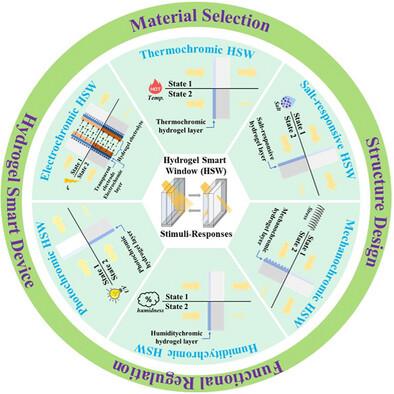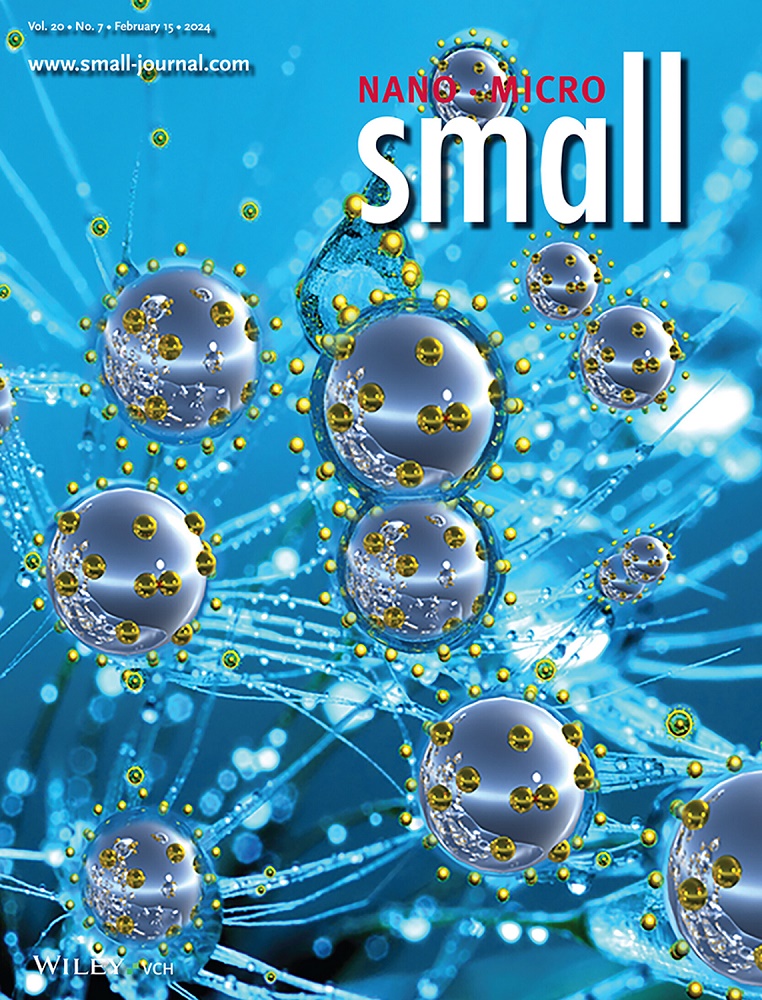水凝胶智能窗:工作机制,最新发展和前景
IF 12.1
2区 材料科学
Q1 CHEMISTRY, MULTIDISCIPLINARY
引用次数: 0
摘要
具有节能功能的智能窗户可以动态调节透光率和窗户光学特性,这对建筑节能至关重要。作为一种典型的湿软材料,水凝胶具有可编程的网络结构、优异的机械柔韧性和多功能性,因此使其成为构建多功能SWs最有前途的候选材料之一。然而,尽管水凝胶智能窗技术的快速发展,各种类型的水凝胶,包括热致、电致、光致变色的水凝胶已经被广泛报道,但最近的研究进展、当前的挑战和未来的前景却很少被证明。本文系统地综述了近年来热致变色、电致变色、光致变色、湿致变色、机械致变色、磁致变色和盐致变色的研究进展。首先,介绍了每一种HSW的制造策略,特别关注功能材料、工作原理和性能增强。同时,总结和比较了每一种HSW的优缺点。然后,讨论了一些新兴技术,如双刺激触发hsw和多功能集成设备。最后,阐述了高通量固体固体材料存在的问题和未来的机遇,以促进未来的科学研究和实际应用。本文章由计算机程序翻译,如有差异,请以英文原文为准。

Hydrogel Smart Windows: Working Mechanisms, Recent Developments, and Perspectives
Smart windows (SWs) with energy‐saving capabilities can dynamically regulate light transmittance and window optical characteristics, which is crucial for building energy efficiency. As a kind of typical wet‐soft material, hydrogels have programmable network structures, excellent mechanical flexibilities, and multifunctionality, thus enabling them to be one of the most promising candidates to construct multifunctional SWs. However, although the rapid advance of SWs technology, various types of SWs, including thermo‐, electro‐, photochromic SWs, have been extensively reported, the recent research development, current challenges, and future perspectives of hydrogel‐based smart windows (HSWs) have been rarely demonstrated. This review systematically summarizes the research progress of HSWs, comprising thermochromic, electrochromic, photochromic, humidity‐responsive, mechanochromic, magnetochromic, and salt‐responsive HSWs in recent years. First, the fabrication strategies for every HSW are presented, particularly focusing on functional materials, working principles, and property enhancement. Meanwhile, the strengths and weaknesses of every HSW are summarized and compared. Then, some emerging technologies, such as double‐stimulus‐triggered HSWs and multifunction‐integrated devices, are discussed. Finally, the existing issues and future opportunities for HSWs are demonstrated to facilitate future scientific research and practical applications.
求助全文
通过发布文献求助,成功后即可免费获取论文全文。
去求助
来源期刊

Small
工程技术-材料科学:综合
CiteScore
17.70
自引率
3.80%
发文量
1830
审稿时长
2.1 months
期刊介绍:
Small serves as an exceptional platform for both experimental and theoretical studies in fundamental and applied interdisciplinary research at the nano- and microscale. The journal offers a compelling mix of peer-reviewed Research Articles, Reviews, Perspectives, and Comments.
With a remarkable 2022 Journal Impact Factor of 13.3 (Journal Citation Reports from Clarivate Analytics, 2023), Small remains among the top multidisciplinary journals, covering a wide range of topics at the interface of materials science, chemistry, physics, engineering, medicine, and biology.
Small's readership includes biochemists, biologists, biomedical scientists, chemists, engineers, information technologists, materials scientists, physicists, and theoreticians alike.
 求助内容:
求助内容: 应助结果提醒方式:
应助结果提醒方式:


